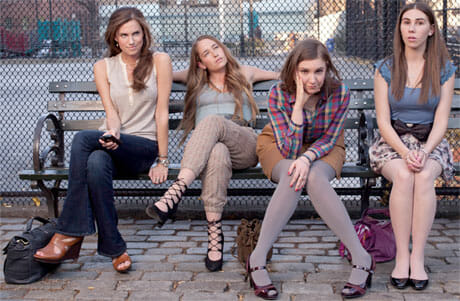
In her new HBO series Girls, writer/director Lena Dunham plays a young writer who hopes to publish a book of essays. Perhaps Dunham should pursue that direction in real life. Her smart and idiosyncratic comedic voice would probably work better on the page than on the screen, without real people embodying her intensely self-absorbed and unlikable characters.
Girls reinforces every stereotype people my age believe about the kids coming up from behind. They’re painfully spoiled and arrogant and have their eyes locked permanently on their own navels (and/or the @Connect tab on their Twitter page). These are broad, sweeping generalizations that aren’t that particularly truthful (I know many hard-working, unassuming, responsible adults in their twenties) but Girls supports every point made by people already inclined to dislike the so-called “Millennials”.
Dunham’s aspiring author, Hannah Horvath, is a 24-year-old Brooklynite supported entirely by her parents, who suddenly cut her off in the show’s first scene. She’s unemployed and awkwardly quits her unpaid internship at a small publishing house when her boss (Chris Eigeman) refuses to pay her. She regularly has humiliating sex with a would-be actor (Adam Driver) who looks like Justin Long’s buffer, non-shirt-owning brother, and who never leaves his apartment or returns her texts or calls. Her life’s a total mess.
Her friends aren’t much better. The responsible Marnie (Allison Williams) seems like the best adjusted of the lot, with a job at an art gallery and a devoted, obnoxiously sensitive boyfriend (Christopher Abbott). (In one of Dunham’s cleverer steps, the men of Girls essentially represent a gender-swapped take on the virgin/whore dynamic present in whatever shows or movies actually have two female characters of note.) Marnie’s both stressed and bored and will almost definitely wind up sleeping with Jorma Taccone from the Lonely Island, who appears later in the season as a supremely confident artist. Jessa (Jemima Kirke) is an old friend and irresponsible free spirit who blows in from Europe and staggers everybody but Marnie with her façade of effortless cool. Jessa’s the most damaged character here, which usually would make her the most sympathetic. Somehow she’s still the least likable of the bunch, though, a patronizingly worldly hedonist who mollifies the pain and loneliness of that lifestyle with random hookups and self-destructive behavior. She’s stuck in a feedback loop of bad decisions.
Jessa’s cousin Shoshanna (Zosia Mamet, who also plays Peggy’s photo editor friend on Mad Men) is somehow both the most actively annoying character on the show but also the most likable. She’s oblivious in a different and less obnoxious way than the rest, addicted to bad TV and girl-power self-help books and ashamed of being a virgin in her twenties. Her Sex and the City obsession might just be a preemptive parody of the show many might expect Girls to be, but she’s not any more in love with an unrealistic fantasy life than Hannah or Jessa.
Girls might be an honest look at what it’s like to be a recent college graduate living in New York in 2012, but that doesn’t mean it’s not a fantasy, no matter how dark it gets. The people who live like this in real life, the smug, jobless, self-satisfied twentysomethings of Brooklyn who live off their parents and believe their every creative whim is inspired and worth pursuing, who avoid responsibility and confuse adult life with collegiate aimlessness, live as unrealistically as the socialites of Sex and the City.
Of course that might prove to be the point of Girls, as these characters deal with the ongoing deflation of adult life. This is one of the perils of episodic TV reviews. I’ve seen the first three episodes; the show gets better, and some the characters seem to realize they need to grow and accept maturity. Judging any of them by this first episode is a bit premature. They are all extremely unlikable in this first episode, though, so much so that I had to talk my wife into giving the second episode a chance.
Most of my female friends are in their early thirties. Some of them are mothers. They all have careers. Some of them (like my wife) have already watched the first few episodes of Girls. Others are only aware of it through HBO’s marketing blitz and the avalanche of press it’s received the last few weeks. The only ones who know or care enough about Girls to have an opinion are extremely annoyed by this show, almost bordering on offense. These are women who had careers when they were 24, supporting themselves in strange, expensive cities, or working on masters or PhDs while also holding down a job. Obviously the economy and job market are greatly impaired today compared to ten years ago (although the burst of the dot-com bubble and September 11th were a bit of a one-two economic punch). But I understand why my friends would resent characters like these and the generational clichés they represent. We’re not supposed to love Hannah and her friends or support every bad decision they make, but the show clearly wants us to empathize with them. Instead we just want them to grow up.